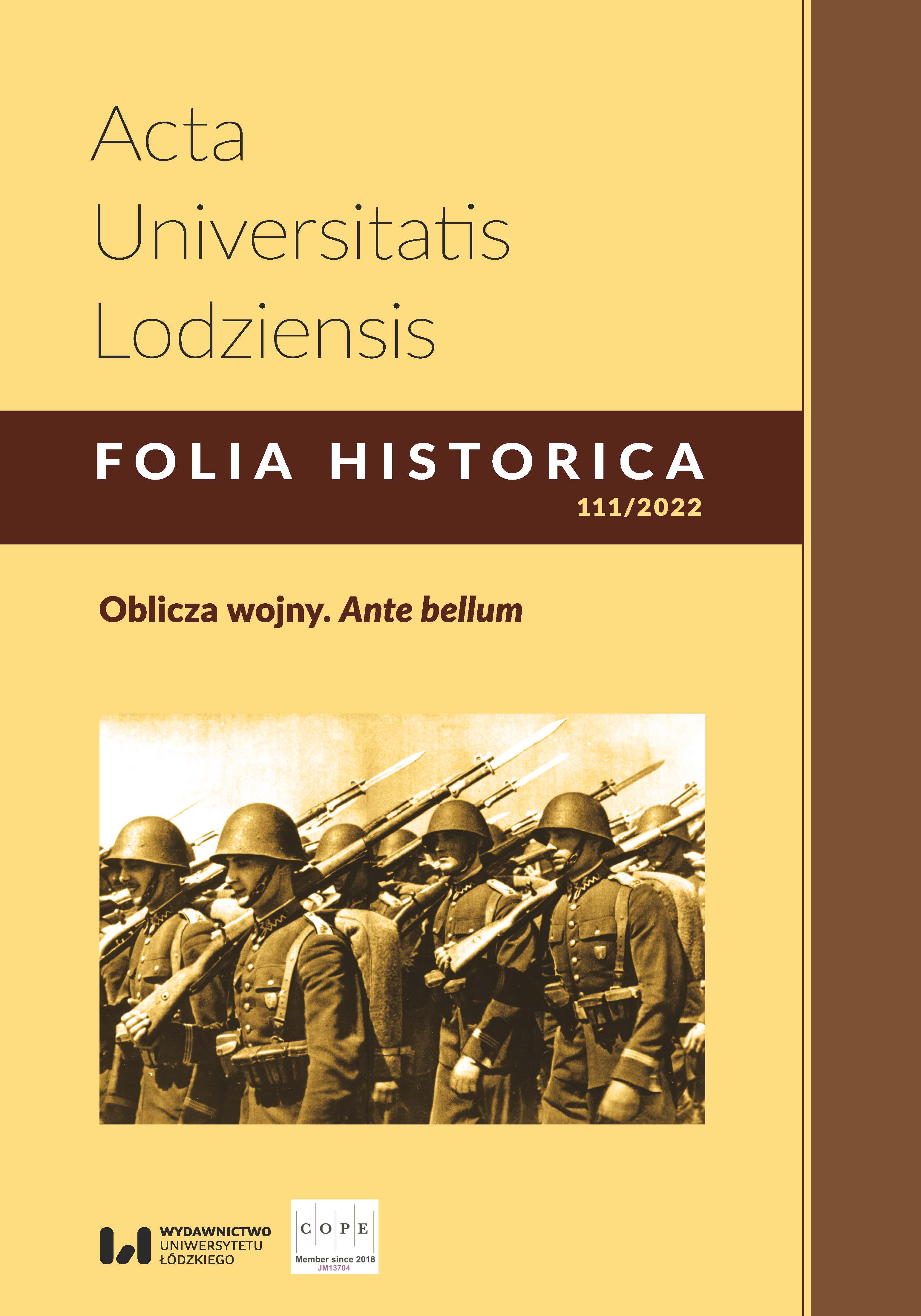The allocution as the element of the battle ritual. The sixteenth-century chronicle context
DOI:
https://doi.org/10.18778/0208-6050.111.03Keywords:
late medieval / early modern history of warfare, allocution, rite of war, Kingdom of Poland, chroniclesAbstract
One of the battle ritual’s elements (especially from the narrative sources point of view) was the war chief ’s speech. Its aim was to build up the army’s morale in the face of the inevitable confrontation danger. The speech was proving the commander’s brave and determination in the realisation of military aim and contained the elements, which were elevating the future happening (the battle) to the importance of the forces majeure’s conflict. In this spin the enemy was featured as the forces of darkness’s emanation, what served creation simple binary opposition between ours/the good ones and the aliens/ the bad ones. These practise was the typical measure founded on the tearing the enemy of the qualities treated as the dignity and integrity attributes off. The analyse is based on the sixteenth-century chronicle accounts, including those written by Marcin Bielski and Maciej Stryjkowski and the additional texts concerning particular clash. Its results are presented against the chronologically wide background. It has been determined that de facto two separate types of the allocution applied equally. The first of them was the real type, very rare, short and laconic. The second one was the literary creation in description of the battle. The longer was the lag between the happening described in the chronicle and the moment of description, the more elaborate began the allocution. That is why in the article the allocution is acknowledged as a part of created battle ritual. By extension, it made up specific accumulation of the dramatic points in the tale, even if it was not real. Due to it, the chronicle narration created schematic picture of the past, responding to the requirement of building some kind of the country’s and dynasty’s identity. In connection with this purpose, religious differences between Christian army of Poland and the Russian Orthodox or Muslim military were emphasized in the question of conflict between the Kingdom of Poland and its enemies.
Downloads
References
Bielski M., Kronika polska, wyd. K. J. Turowski, Sanok 1856.
Google Scholar
Decius J. L., De Sigismundi regis temporibus liber 1521, wyd. W. Czermak, Kraków 1901.
Google Scholar
Decjusz J. L., Księga o czasach króla Zygmunta, przekł. K. Kumaniecki et al., wyd. T. Bieńkowski, Warszawa 1960.
Google Scholar
Górnicki Ł., Dzieje w Koronie Polskiej […] od roku 1538 aż do roku 1572, [w:] Ł. Górnicki, Pisma, t. II, wyd. R. Pollak, Warszawa 1961.
Google Scholar
Górski S., Victoria Polonorum de Valachis regnante Sigismundo primo in Polonia descripta ex commentariis Stanislai Gorski, canonici Cracoviensis, [w:] Acta Tomiciana. Epistolarum, legationum, responsorum, actionum et rerum gestarum Serenissimi Principis Sigismundi Primi regis Poloniae Magni Ducis Lithuaniae per Stanislausm Górski canonicum Cracoviensem et Plocensem collectarum, t. XIII, wyd. Z. Celichowski, Poznań 1915.
Google Scholar
Heidenstein R., Dzieje polskie od śmierci Zygmunta Augusta do roku 1594 ksiąg XII, przekł. M. Gliszczyński, t. I–II, Petersburg 1857.
Google Scholar
Kromer M., Kronika polska […] biskupa warmińskiego ksiąg XXX dotąd w trzech językach, a mianowicie w łacińskim, polskim i niemieckim wydana, na język polski z łacińskiego przełożona przez Marcina z Błażowa Błażowskiego, wyd. K. Pollak, Sanok 1857.
Google Scholar
Sacharinus S., Descriptio duorum certaminum, quae Sigismundi regis Poloniae milites cum Petro Ion palatino Moldaviae et cum eius exercitibus habuerunt, Kraków 1531.
Google Scholar
Stryjkowski M., Kronika polska, litewska, żmudzka i wszystkiej Rusi […], wyd. M. Malinowski, t. II, Warszawa 1980 (fotooffset z wydania Warszawa 1846).
Google Scholar
Wapowski B., Kroniki […] z Radochoniec kantora katedr. krakowskiego część ostatnia czasy podługoszowskie obejmująca (1480–1535), wyd. J. Szujski, [w:] Scriptores Rerum Polonicarum, t. II, Kraków 1874.
Google Scholar
Althoff G., Potęga rytuału. Symbolika władzy w średniowieczu, przekł. A. Gadzała, Warszawa 2011.
Google Scholar
Bołdyrew A., Badania historyczno-wojskowe nad epoką Piastów i Jagiellonów, „Klio. Czasopismo poświęcone dziejom Polski i powszechnym” 2019, t. XLIX, nr 2, s. 3–18.
Google Scholar
DOI: https://doi.org/10.12775//KLIO.2019.012
Dalewski Z., Rytuał i polityka. Opowieść Galla Anonima o konflikcie Bolesława Krzywoustego ze Zbigniewem, Warszawa 2005.
Google Scholar
Geertz C., Centra, królowie i charyzma. Refleksje o symbolice władzy, [w:] C. Geertz, Wiedza lokalna. Dalsze eseje z zakresu antropologii interpretacyjnej, przekł. D. Wolska, Kraków 2005, s. 127–152.
Google Scholar
Korolko M., Słownik kultury śródziemnomorskiej w Polsce, Warszawa 2004.
Google Scholar
Potkowski E., Rycerze w habitach, Warszawa 1974.
Google Scholar
Prietzel M., Kriegführung im Mittelalter. Handlungen, Erinnerungen, Bedeutungen, Paderborn 2006.
Google Scholar
Rubenstein J., Guibert of Nogent. Portrait of a Medieval Mind, New York 2002.
Google Scholar
Runciman S., Dzieje wypraw krzyżowych, t. I (Pierwsza krucjata i założenie Królestwa Jerozolimskiego), przekł. J. Schwakopf, Warszawa 1987.
Google Scholar
Sowa J., Fantomowe ciało króla. Peryferyjne zmagania z nowoczesną formą, Kraków 2011.
Google Scholar
Swój – obcy – wróg: wędrówki w labiryntach kultur, red. T. M. Korczyński, Gdańsk 2018.
Google Scholar
Środa M., Obcy, inny, wykluczony, Gdańsk 2020.
Google Scholar
Tilly C., As Sociology Meets History, New York 1981.
Google Scholar
Downloads
Published
How to Cite
Issue
Section
License

This work is licensed under a Creative Commons Attribution-NonCommercial-NoDerivatives 4.0 International License.











